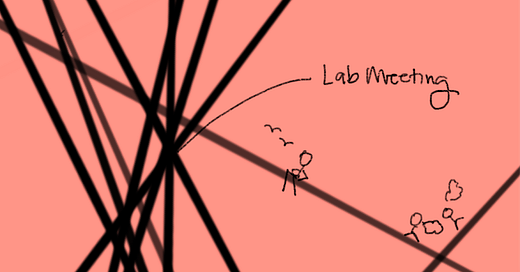What do you do at lab meetings?
On Wednesdays, our research group at the University of Maine Agroecology Lab convenes for a lab meeting, much like many academics, or other communities of practice, around the world. While agroecology lab meetings may not be as top-secret as White House principal committee sessions, I still find myself curious about how other groups spend their time together — and the best way to find out is simply to talk about it! Consider this an info leak about how we use our meeting time with hopes to inspire you to chime in with a blurb about how your group spends lab meetings?
For context, our meetings are attended by a mix of in-person and virtual lab members. The breakdown of our lab is: Our PI, Dr. Rachel Schattman, one lab manager, two post-doctoral researchers, two professional staff members, four PhD students, one masters student, one to two undergraduate research assistants in the summer, and a partridge in a pear tree. We have both quantitative and qualitative researchers in our group, with a broad range of interests. You can find out more about our lab on our website.
I perused through our lab meeting archive and clustered our activities into the following categories:
State of the lab: We always kick off the semester with a ‘State of the Lab’ address during which our PI shares the status of all lab projects and we co-create the lab calendar for the upcoming semester.
Semester themes: Several semesters we have chosen an overarching theme or skill-based practice for our lab meetings. These have included:
Diversity, equity, inclusion and justice: One semester we participated in the Racial Equity Challenge by Food Systems New England (FSNE). We rotated discussion facilitators, who tapped into the reflections and call to action prompts provided by FSNE. A guest speaker, Anila Karunakar of the Community and Connections office, joined us for a session as well.
Co-creation of a lab code of conduct: This was a semester-long endeavor with a living lab code of conduct as an outcome.
Scientific communication: In another semester, our lab meetings were attended by a communications intern who facilitated ‘Research Diaries.’ These were bi-weekly reports of our research activity, a short blurb about something we were looking forward to in our work, and photos. These were read by other lab members with the goal of facilitating a sense of cohesion among our qualitative and quantitative lab group and to practice writing in plain language with conciseness.
Data management discussions: Here we emphasized tidying up metadata and discussing data management practices including data archival, star schema, and data cleaning practices. The majority of the heavy lifting was done outside of meetings in pairs. Meetings were nice for reviewing examples and group problem solving.
Lab journal club: This spring we have reinvigorated our lab journal club. Rotating facilitators have chosen papers that could be applicable to both the qualitative and quantitative folks in our group including:
Practice presentations: For lab members seeking feedback on an upcoming presentation.
Guest speakers: Agroecology or agroecology-tangential guests joined us to discuss their work in a mix of academic institutions, NGO and governmental organizations (e.g. University of Vermont, Maine Organic Farmers and Gardeners Association, Natural Resource Conservation Service). We also recently had a collaborative meeting with the Ong Agroecology Lab at Dartmouth, which I found particularly interesting for thinking about the utility of quantitative tools for integrating human dimensions to theoretical ecology.
Journal clubs have been particularly fruitful in my opinion as a result of the qualitative and quantitative mix in our group and the spectrum of approaches that vary in their use of participatory action research and ecology. While this has been an asset for discussions on the field of agroecology, at moments it has been a barrier for nuanced in-the-weeds discussions about more specific topics. Tradeoffs! Above all else I feel extremely grateful for the time set aside to drink coffee and connect in our community of practice.
But enough about us, what do you all do? What has worked, what hasn’t? How has your group leaned into diverse research topics within a group to make the time useful for all?





